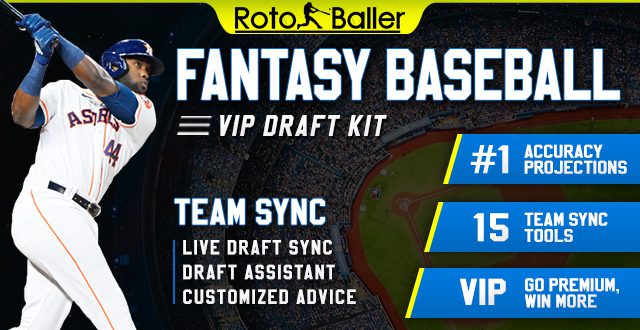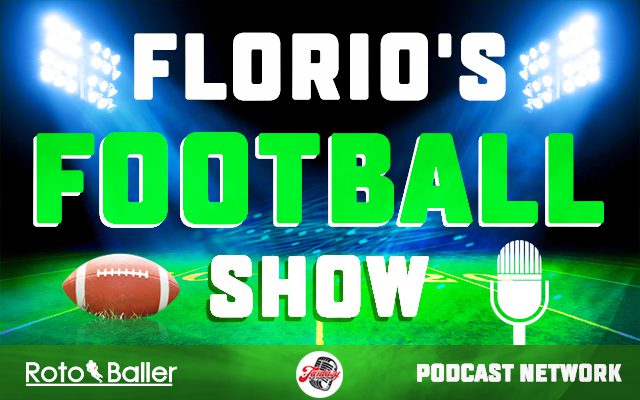We’re constantly trying to come up with new features that will help you dominate your fantasy leagues. Last year we built a tool that identifies the biggest trends in a pitcher's strikeout rate over the last thirty days. The tool is for Premium subscribers only, and can be found here. With our sample size being so small this early in the season though, we will look at the difference between pitchers' final 2016 K-Rate and their current K-Rate through two to three starts.
Missing bats is the #1 way a pitcher can control his own fate. If hitters make contact, the pitcher is largely at the mercy of the atmosphere, the weather, the ball park, the ability/work ethic of his fielders, and sometimes just sheer luck. This is ultimately why strikeouts are so important. By looking at pitchers with positive trends in their strikeout rate, we can spot improving or declining pitchers. If the K-rate is improving, but the ERA and WHIP are less than ideal, it can present a buying opportunity. On the flip side, you may want to sell a pitcher with a declining K-rate, if he wasn't supposed to be that good to begin with.
This particular article will focus on two strikeout rate risers and two fallers, and make an attempt to determine how you should treat each pitcher.
Be sure to check all of our fantasy baseball lineup tools and resources:- Fantasy baseball trade analyzer
- BvP matchups data (Batter vs. Pitcher)
- PvB matchups data (Pitcher vs. Batter)
- Who should I start? Fantasy baseball comparisons
- Daily MLB starting lineups
- Fantasy baseball closer depth charts
- Fantasy Baseball live scoreboard
- Fantasy baseball injury reports
K-Rate Risers
Wily Peralta, MIL
2016 K-Rate: 16.8%, 2017 K-Rate: 27.3
I recently wrote a waiver wire piece which Wily Peralta was a part of, which can be found here. Peralta has gotten off to a blazing start this season, pitching past the Rockies (at home, not at Coors) and the Blue Jays in impressive fashion. However, his career numbers paint a much different picture than what we’ve seen this season. What we have here is a pitcher with a career 4.16 ERA and 1.41 WHIP. His 16.8% strikeout rate last season nearly matched his 16.7% career rate, and his 8.1% career walk rate is about league average. So far this season his ERA sits at 2.45 with a 1.18 WHIP, and his K/9 is at a career-high 9.82. His FIP/xFIP of 2.12/3.39 support his low ERA, and his BABIP is only slightly below his career rate (.296 in 2017, .307 career).
Peralta is currently sporting the highest GB% of his career at 53.8%, and has not allowed a home run in either of his starts this season. While he won’t go the whole season without allowing a HR, the increased ground ball rate looks good thanks to hitters making weaker contact on him than ever before. His 22.2% soft contact rate and 29.6% hard contact rates are both trending in the right direction after last season. Hitters have only his .205 off of him this season, much lower than his career .271 batting average against. This season he is throwing more first-pitch strikes than ever before, and is doing so with an increased fastball velocity. His career average is 94.9mph, but this season that number is up to 96.3mph and touches 98 at times. He has also been tinkering with a curveball, which he hasn’t thrown since his rookie season.
The increased velocity has it’s up and downs however; he currently holds a career-high 4.09 BB/9 rate as well. If he can wrangle in his control we could be looking at a better season for Peralta compared to last, but given his career stats he won’t hold a sub-3.00 ERA all season long. His swinging strike rate is at a career-low 6.4%, meaning the strikeout rate is likely to come down to his career norms. If I owned Peralta, I would be looking to sell high on him.
Verdict: Sell
Michael Wacha, STL
2016 K-Rate: 18.8%, 2017 K-Rate: 28.6
Over the past three seasons, Michael Wacha has had a ton of stats trending in the wrong direction. Each year his ERA has risen, he has struck out less and walked more hitters per nine innings, and his HR/FB rate has risen. He dealt with a shoulder injury again last season, which certainly contributed to his ERA ballooning to 5.09. Wacha was electric when he first got into the league in 2013 and made a couple starts, but since then it has been a steady decline for the young right hander. Young is the key word there; Wahca turns 26 years old on July 1, and already has three seasons under his belt. Heading into 2017 healthy, we have seen improvements in his game in the early goings.
His 28.6% K-Rate is the highest since his debut season, and his 6.1% walk rate is the lowest of his career. Hitters are still hitting .261 off of him this season, but his hard contact rate is down to 21.9% this season, which is a career low. His swinging strike rate (SwStr%) is at a career-high 14.4%, and his contact rate is at a career-low 71.1%. The best thing Wacha did for himself this offseason was work a sinker into his repertoire, and refine his changeup back to its former glory. The sinker gives him a viable fourth option after the fastball, changeup, and cutter. The downward movement of the sinker helps hitters not sit on his fastball as much, and it has led to an 11.4% SwStr% on his fastball (career-high). His changeup, which used to be among the best in baseball, currently has a 30.6% SwStr%, which is much closer to his rookie season when it sat at 23.4%. Last season his changeup has a SwStr% of only 18.2%.
I am buying the changes Wacha has made. As long as he stays healthy there is no reason a 26-year old pitcher who had two straight sub-3.40 ERA season can’t replicate that success. Last year was dreadful for Wacha, but this season should be a rebound year.
Verdict: Buy
K-Rate Fallers
Kenta Maeda, LAD
2016 K-Rate: 25.0%, 2017 K-Rate: 20.9%
After throwing just over 1,500 innings over eight seasons internationally, Kenta Maeda came over to the major leagues last season and pitched very well. Over 32 starts, Maeda pitched 175.2 innings with a 3.48 ERA and 1.14 WHIP. He posted a solid 3.58 K/BB ratio, and held opposing hitters to a .228 batting average against. Overall, he did very well, but the success hasn’t translated over into 2017. Through two starts, his ERA sits at 6.30 with a 1.40 WHIP. His strikeout rate is down, and his BB/9 rate is up. His hard contact rate is all the way down to 16.1% this season, so what seems to be the problem here?
One of the main culprits that dragged Maeda down last season hasn’t resolved itself. Last season he only pitched six or more innings in 13 of his starts. He averaged less than six innings per start, and still managed to rack up 16 wins last season. The first two times through the order, Maeda had an ERA of 2.86 last season. When he made it to a third time, that ERA ballooned to 5.52 and opposing hitters hit .333 off of him over 31 innings. This season things haven’t been any different. In his last start against the Rockies he cruised through four innings, with a Charlie Blackmon HR his only blemish. In the fifth he reached the top of the order for the third time, and allowed a walk, two hits, and two earned runs to bring his total to four for the outing. He is still getting fatigued early as hit outings go on, something that plagued him down the stretch last season.
Maeda is a good pitcher. He can locate and mix his pitches to keep hitters off balance. The only problem is he couldn’t do that for more than five innings last season, and is having the same issues this season. If you can find someone now to buy Maeda at full price, I would pull the trigger. You shouldn’t trade someone when their value is at its lowest, but these concerns with Maeda are legitimate and I don’t think there’s an easy fix in sight.
Verdict: Hold/Sell
Cole Hamels, TEX
2016 K-Rate: 23.6%, 2017 K-Rate: 17.0%
Since 2007, Cole Hamels has been the definition of a workhorse on the mound. Over those 10 seasons, he has failed to throw 200 innings only twice, and in each of those seasons he eclipsed 180. His strikeout and walk rates have been fairly consistent, and his ERA has hovered around 3.00 for the majority of his career. His first full season in Texas last season was a prototypical Hamels season in many ways. He struck out 8.97 hitters per nine, held a 3.32 ERA, and threw for over 200 innings once again. Unfortunately, some warning signs popped up also. His walks per nine hadn’t been above 2.64 since his debut back in ’06, and that number sky-rocketed to 3.45 last season. Is caused his WHIP to increase to 1.31 last season, which was a career high.
So far this season Hamels has had the same issues, currently sporting a 3.46 BB/9 rate. His FIP/xFIP of 5.17/4.72 show that he has been getting very lucky, considering his ERA currently sits at 2.77. Last year he was able to out-pitch his FIP/xFIP, but the difference was far less drastic than this. His fastball velocity and pitch movements are all still similar to last year, but his soft contact rate is down to only 10.8% and his SwStr% is at 6.8%, which is nearly twice as low as his career-low of 11.5%. Hamels is due for some positive regression, but what we saw last season may be the norm for him moving forward, instead of the dominant Hamels we saw on the Phillies.
Some of his short comings are legitimate concerns (increased walk rate) while others this season have just been bad luck (low SwStr%). Hamels can still be an effective fantasy starters, even with the increased walk and slightly decreased strikeouts. As long as you know you’re not getting the mint-condition version when you acquire him, I would have no problem buying Hamels, who is more than capable of still pitching a seven-inning gem from time to time.
Verdict: Buy/Hold
 RADIO
RADIO

























